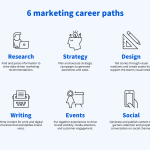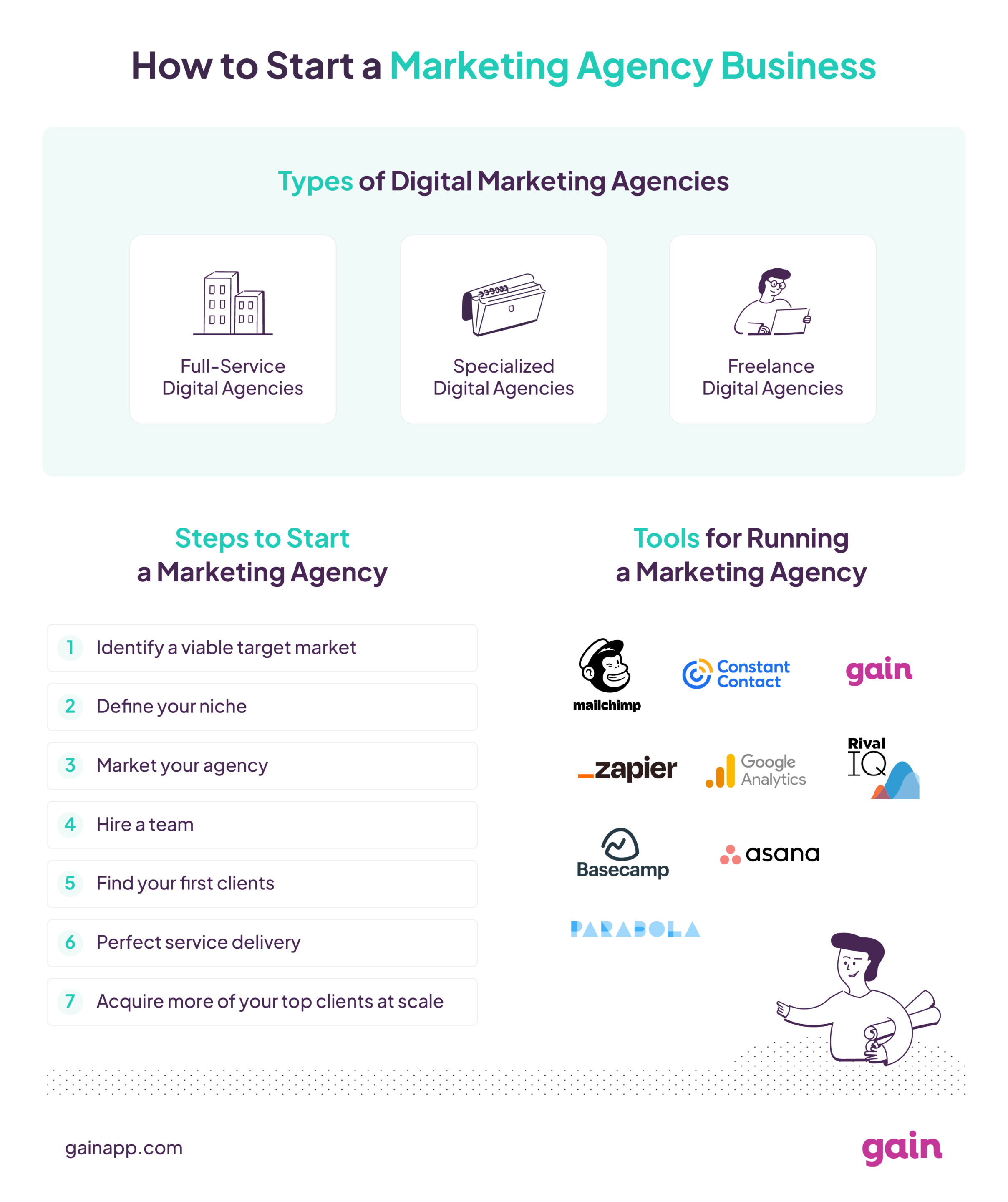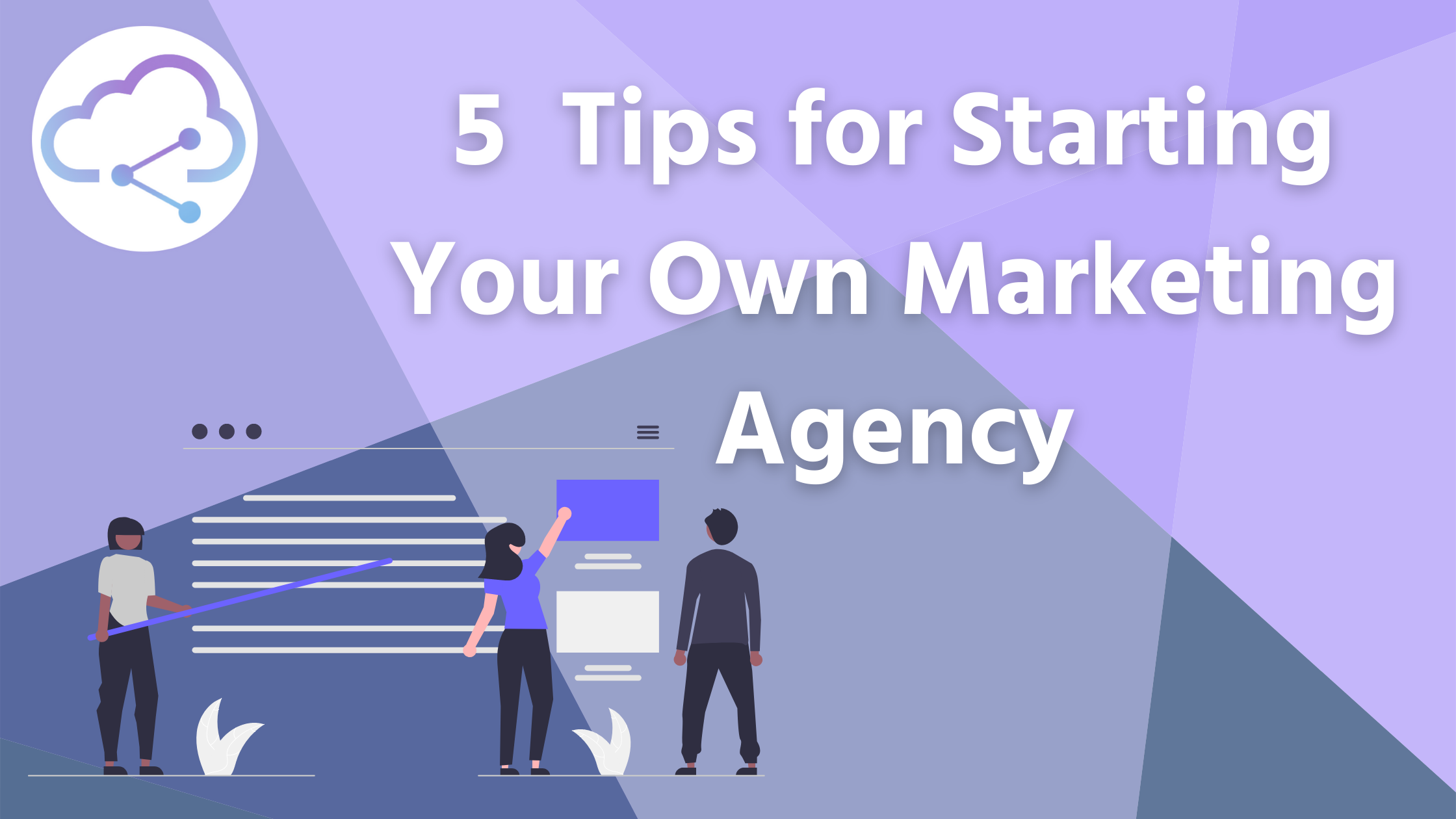Starting your own marketing agency is an exciting yet challenging endeavor that requires careful planning, strategic thinking, and a clear vision. With the digital landscape constantly evolving, the demand for innovative marketing solutions is higher than ever. However, breaking into the industry and building a successful agency demands more than just creativity—it requires a solid business foundation, a deep understanding of client needs, and the ability to adapt to market trends. Whether you're a seasoned marketer or a passionate entrepreneur, this article offers practical advice to help you navigate the complexities of launching and growing your own marketing agency in a competitive environment.
Starting My Own Marketing Agency - Advice?
Starting your own marketing agency can be an exciting yet challenging endeavor. To succeed, you need a clear plan, a strong understanding of the market, and the ability to adapt to changes. Below, we’ll explore key steps and advice to help you build a successful marketing agency.
See Also What Is It Like Having a Career in Marketing?
What Is It Like Having a Career in Marketing?1. Define Your Niche and Target Market
Choosing a specific niche is crucial for standing out in the competitive marketing industry. Identify your strengths and the type of clients you want to serve. For example, you might focus on social media marketing for small businesses or SEO services for e-commerce brands. A well-defined niche helps you tailor your services and attract the right clients.
2. Develop a Business Plan
A solid business plan is the foundation of any successful agency. Outline your mission, vision, goals, and financial projections. Include details about your service offerings, pricing strategy, and marketing approach. A well-structured plan will guide your decisions and help you secure funding if needed.
See Also What is it like having a career in marketing?
What is it like having a career in marketing?3. Build a Strong Online Presence
As a marketing agency, your online presence is your credibility. Create a professional website that showcases your portfolio, client testimonials, and case studies. Use SEO and content marketing to attract potential clients. Additionally, maintain active profiles on social media platforms to engage with your audience and demonstrate your expertise.
4. Invest in the Right Tools and Technology
To deliver high-quality services, you need the right tools and technology. Invest in marketing automation software, analytics tools, and project management platforms. These tools will help you streamline operations, track performance, and provide value to your clients. Below is a table of essential tools for a marketing agency:
See Also Where Are All the Decent/High Paying Marketing Jobs?
Where Are All the Decent/High Paying Marketing Jobs?| Tool Category | Examples |
|---|---|
| Marketing Automation | HubSpot, Marketo |
| Analytics | Google Analytics, SEMrush |
| Project Management | Trello, Asana |
| Social Media Management | Hootsuite, Buffer |
5. Network and Build Relationships
Networking is essential for growing your agency. Attend industry events, join professional associations, and connect with other professionals on LinkedIn. Building strong relationships can lead to referrals, partnerships, and collaborations. Additionally, prioritize client relationships by delivering exceptional service and maintaining open communication.
6. Stay Updated with Industry Trends
The marketing industry is constantly evolving, so staying updated with the latest trends and technologies is vital. Follow industry blogs, attend webinars, and participate in online courses. This knowledge will help you offer innovative solutions to your clients and maintain a competitive edge.
See Also What Is a Reasonable Marketing Salary for a Recent Graduate?
What Is a Reasonable Marketing Salary for a Recent Graduate?By following these steps and continuously refining your strategies, you can build a successful marketing agency that thrives in a competitive market.
Can I start a marketing agency on my own?

 Visual Content Creator/Social Media Manager Salary?
Visual Content Creator/Social Media Manager Salary?What Skills Do You Need to Start a Marketing Agency?
Starting a marketing agency requires a combination of technical, creative, and business skills. Here are the key skills you need:
- Marketing Expertise: A deep understanding of digital marketing strategies, including SEO, PPC, social media, and content marketing.
- Communication Skills: The ability to clearly convey ideas to clients and team members.
- Project Management: Skills to manage multiple campaigns, deadlines, and client expectations effectively.
How Much Capital is Required to Start a Marketing Agency?
The amount of capital needed to start a marketing agency can vary, but here are the primary expenses to consider:
- Initial Setup Costs: This includes office space (if needed), software tools, and equipment.
- Marketing Budget: Allocating funds for your own marketing efforts to attract clients.
- Operational Costs: Ongoing expenses like salaries, utilities, and software subscriptions.
What Legal Steps Are Involved in Starting a Marketing Agency?
Starting a marketing agency involves several legal steps to ensure compliance and protection:
- Business Registration: Register your business name and structure (LLC, sole proprietorship, etc.).
- Licenses and Permits: Obtain any necessary licenses or permits required in your area.
- Contracts and Agreements: Draft client contracts, non-disclosure agreements, and terms of service.
How Do You Attract Clients to Your Marketing Agency?
Attracting clients is crucial for the success of your marketing agency. Here are some strategies:
- Build a Strong Online Presence: Create a professional website and optimize it for SEO.
- Leverage Social Media: Use platforms like LinkedIn, Instagram, and Facebook to showcase your expertise.
- Networking: Attend industry events and connect with potential clients and partners.
What Tools and Software Are Essential for a Marketing Agency?
To run a successful marketing agency, you need the right tools and software. Here are some essentials:
- Project Management Tools: Tools like Trello, Asana, or Monday.com help manage tasks and deadlines.
- Marketing Automation: Platforms like HubSpot or Marketo for automating marketing tasks.
- Analytics Tools: Google Analytics and other tools to track campaign performance and ROI.
How do I start a marketing agency?

1. Define Your Niche and Services
Starting a marketing agency begins with identifying your niche and the specific services you will offer. This helps you stand out in a competitive market. Consider the following steps:
- Research the market to identify gaps or underserved industries.
- Choose a specialization, such as social media marketing, SEO, content marketing, or email marketing.
- Define your core services and create packages tailored to your target audience.
2. Create a Business Plan
A solid business plan is essential for guiding your agency’s growth and securing funding if needed. Your plan should include:
- Mission and vision statements to outline your agency’s purpose and goals.
- A detailed financial plan, including startup costs, pricing strategies, and revenue projections.
- A marketing strategy to attract your first clients and build your brand.
3. Build Your Brand and Online Presence
Your agency’s brand identity and online presence are critical for attracting clients. Focus on the following:
- Design a professional logo and create a consistent visual identity.
- Develop a website that showcases your services, portfolio, and client testimonials.
- Leverage social media platforms to engage with your audience and promote your expertise.
4. Assemble a Skilled Team
Your team is the backbone of your agency. To build a talented and reliable team, follow these steps:
- Identify the key roles needed, such as marketers, designers, and account managers.
- Hire experienced professionals or train individuals who align with your agency’s vision.
- Foster a collaborative culture to ensure smooth operations and client satisfaction.
5. Acquire Your First Clients
Securing your first clients is crucial for establishing your agency’s reputation. Use these strategies:
- Leverage your personal network to find potential clients or referrals.
- Offer discounted or free services to build a portfolio and gain testimonials.
- Use targeted outreach through email campaigns or LinkedIn to connect with businesses in your niche.
How much to start a marketing agency?

Initial Costs for Starting a Marketing Agency
Starting a marketing agency requires a clear understanding of the initial costs involved. These costs can vary depending on the scale and services offered. Below is a breakdown of the primary expenses:
- Business Registration and Licensing: Costs for registering your business and obtaining necessary licenses can range from $50 to $500, depending on your location.
- Office Space: Renting an office can cost between $500 to $5,000 per month, depending on the size and location. Alternatively, you can start with a home office to save costs.
- Technology and Software: Essential tools like CRM software, project management tools, and design software can cost between $100 to $1,000 per month.
- Marketing and Advertising: Initial marketing efforts to attract clients can range from $500 to $5,000, depending on the channels used.
- Staffing: Hiring freelancers or full-time employees can cost between $1,000 to $10,000 per month, depending on the number of staff and their expertise.
Ongoing Operational Expenses
Running a marketing agency involves several ongoing expenses that need to be managed effectively. Here are the key operational costs:
- Salaries and Wages: Regular payments to employees or freelancers can range from $2,000 to $20,000 per month, depending on the team size.
- Software Subscriptions: Monthly or annual subscriptions for tools like Adobe Creative Suite, HubSpot, or SEMrush can cost between $100 to $1,000 per month.
- Utilities and Office Supplies: Monthly utility bills and office supplies can range from $200 to $1,000, depending on the office size and usage.
- Marketing and Client Acquisition: Continuous marketing efforts to attract new clients can cost between $500 to $5,000 per month.
- Professional Services: Costs for legal, accounting, and consulting services can range from $200 to $2,000 per month.
Investment in Technology and Tools
Investing in the right technology and tools is crucial for the success of a marketing agency. Here are the essential tools and their associated costs:
- Customer Relationship Management (CRM) Software: Tools like Salesforce or HubSpot can cost between $50 to $500 per month.
- Project Management Tools: Platforms like Trello, Asana, or Monday.com can range from $10 to $100 per month.
- Design and Editing Software: Adobe Creative Suite or Canva Pro can cost between $20 to $100 per month.
- Analytics and SEO Tools: Tools like Google Analytics, SEMrush, or Ahrefs can range from $50 to $500 per month.
- Communication Tools: Platforms like Slack or Zoom can cost between $10 to $50 per month.
Marketing and Client Acquisition Strategies
Effective marketing and client acquisition strategies are essential for the growth of a marketing agency. Here are some strategies and their associated costs:
- Digital Advertising: Running ads on platforms like Google Ads or Facebook can cost between $500 to $5,000 per month.
- Content Marketing: Creating blogs, videos, and social media content can range from $200 to $2,000 per month.
- Email Marketing: Tools like Mailchimp or Constant Contact can cost between $10 to $100 per month.
- Networking Events: Attending or hosting events can cost between $100 to $1,000 per event.
- Referral Programs: Offering incentives for referrals can cost between $100 to $1,000 per month.
Legal and Administrative Costs
Legal and administrative costs are an important part of setting up and running a marketing agency. Here are the key expenses:
- Business Registration: Costs for registering your business can range from $50 to $500.
- Legal Fees: Hiring a lawyer for contracts and legal advice can cost between $200 to $2,000.
- Accounting Services: Hiring an accountant or using accounting software can range from $100 to $1,000 per month.
- Insurance: Business insurance can cost between $50 to $500 per month, depending on coverage.
- Compliance and Permits: Costs for maintaining compliance and obtaining necessary permits can range from $100 to $1,000 per year.
Is it profitable to have a marketing agency?

What Are the Initial Costs of Starting a Marketing Agency?
Starting a marketing agency involves several initial costs that can impact profitability. These costs include:
- Office Space: Renting or leasing office space can be a significant expense, especially in prime locations.
- Technology and Software: Investing in marketing tools, CRM software, and other technologies is essential for delivering services effectively.
- Staff Salaries: Hiring skilled professionals such as marketers, designers, and developers can be costly but necessary for quality service delivery.
- Marketing and Advertising: Promoting your own agency to attract clients requires a budget for online ads, social media campaigns, and other marketing efforts.
- Legal and Administrative Costs: Registering your business, obtaining licenses, and setting up contracts with clients and vendors involve legal and administrative expenses.
What Are the Ongoing Operational Expenses?
Running a marketing agency comes with ongoing operational expenses that need to be managed carefully to maintain profitability. These include:
- Employee Salaries and Benefits: Regular payroll, bonuses, and benefits for your team are recurring costs.
- Software Subscriptions: Monthly or annual fees for marketing tools, analytics platforms, and project management software.
- Office Maintenance: Utilities, internet, and maintenance costs for your office space.
- Client Acquisition Costs: Continuous investment in marketing and networking to attract new clients.
- Training and Development: Keeping your team updated with the latest marketing trends and technologies through training programs.
How Do You Determine Pricing for Services?
Setting the right pricing for your marketing services is crucial for profitability. Consider the following factors:
- Market Rates: Research what competitors are charging for similar services to ensure your pricing is competitive.
- Value Proposition: Price your services based on the unique value and expertise your agency offers.
- Client Budgets: Understand the budget constraints of your target clients and tailor your pricing accordingly.
- Service Packages: Offer different service packages at various price points to cater to a wider range of clients.
- Profit Margins: Ensure that your pricing covers all costs and leaves a healthy profit margin.
What Are the Key Revenue Streams for a Marketing Agency?
A marketing agency can generate revenue through multiple streams, which can enhance profitability. These include:
- Retainer Contracts: Long-term contracts with clients who pay a fixed monthly fee for ongoing services.
- Project-Based Fees: Charging clients for specific projects or campaigns, which can be more lucrative for short-term engagements.
- Consulting Services: Offering expert advice and strategy sessions at a premium rate.
- Performance-Based Pricing: Earning a percentage of the revenue or profits generated from the campaigns you manage.
- Training and Workshops: Conducting training sessions or workshops for clients or other businesses.
What Are the Challenges to Profitability in a Marketing Agency?
Several challenges can affect the profitability of a marketing agency. These include:
- Client Dependence: Relying too heavily on a few major clients can be risky if they decide to leave.
- Market Competition: High competition can drive down prices and make it harder to attract and retain clients.
- Economic Downturns: Economic instability can lead to reduced marketing budgets from clients.
- Keeping Up with Trends: The fast-paced nature of the marketing industry requires constant adaptation and investment in new technologies.
- Client Expectations: Managing and meeting high client expectations can be resource-intensive and challenging.
Frequently Asked Questions from Our Community
What are the first steps to starting a marketing agency?
Starting a marketing agency requires careful planning and execution. Begin by defining your niche—whether it’s social media marketing, SEO, content creation, or a combination of services. Next, conduct market research to understand your target audience and competitors. Once you have a clear vision, register your business, set up a legal structure, and obtain any necessary licenses. Finally, build a strong online presence through a professional website and social media profiles to showcase your expertise and attract clients.
How do I determine pricing for my marketing services?
Pricing your services can be challenging but is crucial for sustainability. Research industry standards to understand what competitors charge for similar services. Consider your experience, expertise, and the value you provide when setting rates. You can choose between hourly rates, project-based pricing, or retainer models, depending on the type of services you offer. Be transparent with clients about your pricing structure and ensure it aligns with the quality of work you deliver.
What tools and resources are essential for a marketing agency?
To run a successful marketing agency, you’ll need the right tools and resources. Invest in project management software like Trello or Asana to streamline workflows and collaborate with your team. Use analytics tools such as Google Analytics and social media insights to track campaign performance. Additionally, graphic design tools like Canva or Adobe Creative Suite can help create visually appealing content. Don’t forget to stay updated with industry trends through blogs, podcasts, and online courses to keep your skills sharp.
How can I attract and retain clients for my marketing agency?
Attracting and retaining clients requires a combination of effective marketing strategies and excellent customer service. Start by building a portfolio that showcases your past work and success stories. Leverage social media, email marketing, and networking to reach potential clients. Offer free consultations or audits to demonstrate your expertise. To retain clients, communicate regularly, deliver results, and exceed expectations. Building long-term relationships through trust and reliability is key to sustaining your agency’s growth.
Leave a Reply


Articles of interest